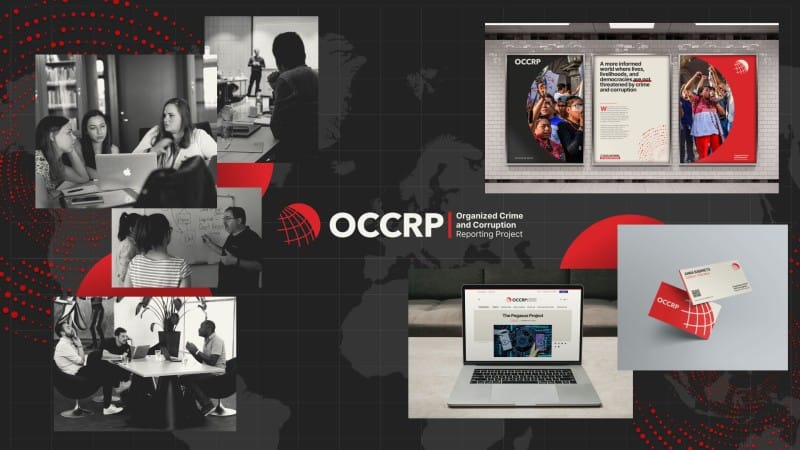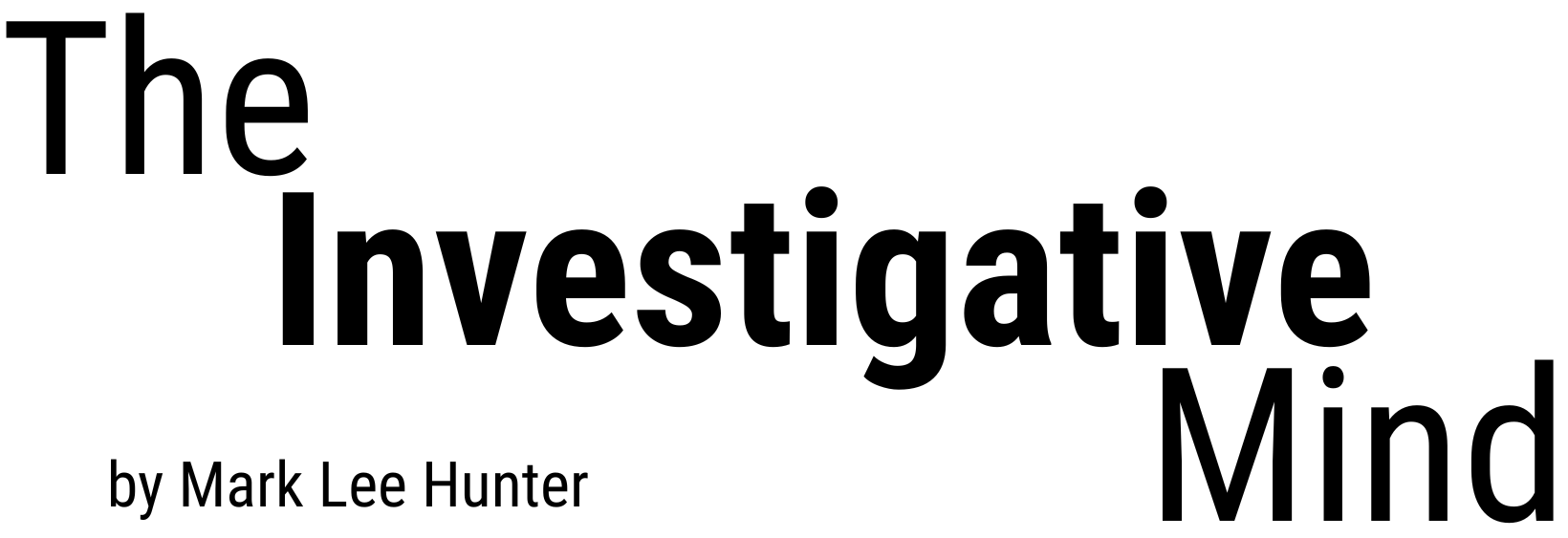Why the OCCRP matters

The organisation attacked by Mediapart and the MAGA movement played (and still plays) an historic role in the evolution of investigative journalism.
By Mark Lee Hunter
Paris – For someone who’s spent his adult life in investigative journalism, it’s a shock to realize that OCCRP – the Organized Crime and Corruption Reporting Project – is largely unknown outside the field.
They mark a profound change in the history of investigative reporting. It isn’t only that they’ve won buckets of major and minor awards in the 18 years since they arrived on the scene. It’s that they did the job in a way that hardly anyone did before.
Investigative reporting around the world tends to focus on individuals or organizations who do things that harm the public interest. OCCRP took a systemic approach, mapping the mechanisms and enablers – the “criminal services industry” – that their adversaries employed. That sometimes involved going after entire states. That’s a big part of what makes their work “incredibly dangerous,” as Marina Walker Guevara of the Pulitzer Center has said. You can get killed, kidnapped – it’s happened to their people – forced into exile or thrown in prison for doing it.
OCCRP appeared at a moment when the future of investigative reporting was anything but assured. In the early 2000s, the Watergate generation was beginning to show its age in the U.S., and there were only scattered handfuls of investigators elsewhere, including France. Most of the 200-odd people who came to Copenhagen in 2003 to sign the founding declaration of the Global Investigative Journalism Network (GIJN), in which OCCRP soon became a central component, were in their 40s and 50s. They worked for an industry whose secular decline had begun with the emergence of broad-band Internet in the mid-1990s (and continues to this day, as everyone reading this knows).
OCCRP, which launched in 2008 after co-founders Drew Sullivan and Paul Radu sought to extend a previous experiment in Bosnia across the entire Balkan region, promised renewal on multiple grounds. They made investigative reporting look bold and brave again. They were young, and they didn’t hide their personalities – Drew Sullivan’s love of stand-up comedy, editor-in-chief Miranda Patrucic’s fashionable garb, Paul Radu’s provocative wit (to do this work, he once said, “You have to love gangsters.”). They were among the first major non-profit media organizations, acting on the groundbreaking theories of the late Charles Lewis; also among the first to work systematically on trans-national stories, and to make capacity-building a focus alongside reporting. No one outside the United States, where Investigative Reporters and Editors Inc. pioneered in capacity-building, trained more journalists in the field today than the OCCRP, starting with their 71 “member centers” across the planet. No one – with the possible exception of Bellingcat, “an intelligence agency for the people” – developed more high-end tools to track wrongdoing through open sources, and made them publicly available.
The worldwide investigative journalism movement would not exist in its current shape or scale without OCCRP. Consider some stories that defined the 2010s – the Panama and Pandora Papers, Offshore Leaks, the Pegasus phone-hacking case, Syria’s state-run drug trafficking, Mexico’s cartels, “laundromats” that cleaned oligarchs’ dirty money. OCCRP played a major or leading role in all of them. They incarnated the moment when the lone wolf reporters of Watergate and Hollywood legend were succeeded by organizations that allied with other organizations and social networks – like the International Consortium of Investigative Journalists (ICIJ) – to expose criminality on an international scale. In OCCRP’s phrase, “It takes a network to fight a network.”
They grew fast and broke rules, written and unwritten. One of them was that journalists should report what authorities do, as opposed to intervening before the authorities act. (Watergate was an epochal exception to that rule, and Woodward and Bernstein knew it.) OCCRP reported when gangsters from one country visited another. They regularly revealed crimes that prosecutors couldn’t or wouldn’t pursue. They went on the offensive against states that jailed their reporters, starting in 2015 with the “Khadija Project”, which retaliated against the Azerbaijani regime’s jailing of their reporter Khadija Ismayilova by exposing the ruling Aliyev family’s assets abroad. They joined the “Daphne Project”, led by Paris-based Forbidden Stories, which continued the work of Maltese anti-corruption reporter Daphne Caruana Galizia after she was killed in a car bombing. When Paul Radu was sued for $2 million – a sum, he wrote, that would have ruined his life – for libel in a London court by a politician, OCCRP responded by continuing to investigate him. The plaintiff finally agreed to settle on favorable terms for OCCRP.
The facts OCCRP uncovers are rigorously documented, and they scrupulously respect the rights of their targets (notably to reply to the facts), but their approach diverges from the “objective” neutrality central to the American concept of journalism. Their work is more like investigative campaign activism, a genre that progressively disappeared from American journalism after the early 20th century Muckraker era and survives today at NGOs like Greenpeace and Human Rights Watch, as well as partisan outlets like Fox News. (I’ve called that approach “stakeholder-driven” journalism, in which the goal is to prevail, not just to chronicle.)
By 2016 their approach included founding an alliance with the NGO Transparency International called the Global Anti-Corruption Consortium, another first, whose motto is “turning headlines into action”. That step was and remains controversial in a news industry that keeps a prudent distance from activism. It was also inevitable – the next step in building coalitions that can resist transnational criminality. It was not entirely unprecedented. The fall of apartheid in South Africa was predicated on an alliance of journalists, civil society groups and lawyers, according to Anton Harber, an historic newspaper editor and journalist in that movement. We will see more such movements, because neither civil society nor journalists can achieve such change on their own.
Another unwritten but powerful rule that OCCRP broke was to never seek government funding. For leading American journalists, state subsidy is a worrisome prospect, as ProPublica’s Stephen Engelberg told Mediapart. ProPublica, another investigative innovation, began with a multi-million dollar private donation. In Europe, that would never happen, especially in the post-Soviet countries where OCCRP began operations. The tradition in Europe is that the state pays for public interest projects; tax breaks for gifts to non-profits, and foundations that provide them, are far less developed than in the US. There are also fewer rich donors, and in Eastern Europe, to paraphrase Balzac, most of the great fortunes were founded on great crimes. Oligarchs capture media by buying them; they don’t subsidize reporters who hold them accountable. What Sullivan told Mediapart – “We made the choice between taking government money and not existing” – was perhaps not the ideal choice in an ideal world, but it was certainly the only one that could work at the time in this world.
You can fairly say that the U.S. and European taxpayer and foundation money granted to OCCRP – over US$ 102 million since it launched, according to their independent audits – strengthened the rule of law in places where journalists and citizens were previously helpless spectators and victims of rampant corruption and criminality. From 2009-23, OCCRP claims that its investigations led to over $11 billion in recoveries of ill-gotten gains, 667 indictments and arrests, and 135 “high-level resignations and sackings”, including several heads of state. One of them was Robert Fico, the Slovakian prime minister, who resigned amidst the massive anti-corruption protests that followed OCCRP reporting partner Ján Kuciak’s assassination in 2018.
That wasn’t “regime change”, as MAGA critics of OCCRP lately charged. Slovakia's government remained; a leader resigned in the face of democratic protest, in a place where journalists were seen as heroes because they stood up for the people. It was certainly another sign that the stakes of investigative journalism have grown bigger, faster, than anyone could have foreseen two decades ago. As the movement expanded across borders it has become a geopolitical force, shaping the environment it investigates. We are still working through the implications of that shift – and so are the enemies of the movement – but this much is certain: No one did more to make that happen than OCCRP, and it is hard to imagine who might have done it without them.
